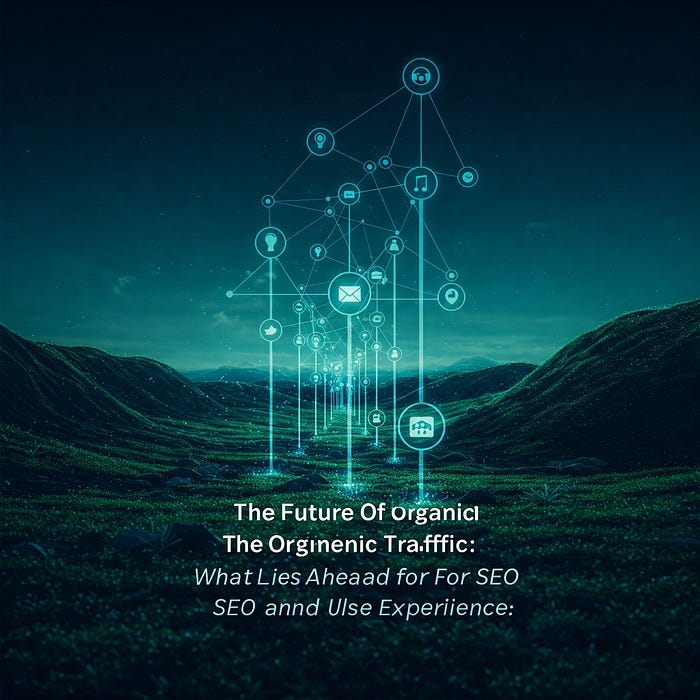- Get link
- X
- Other Apps
In the ever-evolving world of digital marketing, organic traffic remains a cornerstone of success. However, as search engines become more sophisticated and user behavior continues to shift, the strategies we rely on today may not hold the same weight tomorrow. So, what does the future of organic traffic look like, and how can businesses adapt to stay ahead? Let’s dive in.
Search Intent Takes Center Stage
Gone are the days when simply stuffing keywords into your content could guarantee a top spot on search engine results pages (SERPs). Today, search engines like Google prioritize user intent over keyword density. This means that understanding what your audience is truly searching for — and why — is more important than ever.
To stay competitive, focus on creating content that answers specific questions, solves problems, and provides genuine value. Think beyond keywords and consider the broader context of your audience’s needs. For example, instead of targeting “best running shoes,” create content around “how to choose running shoes for marathon training.”
The Rise of Voice Search and AI
Voice search is no longer a futuristic concept — it’s here, and it’s growing rapidly. With the proliferation of smart speakers and voice assistants like Siri, Alexa, and Google Assistant, more users are searching using natural, conversational language.
This shift means that long-tail keywords and question-based queries are becoming increasingly important. For instance, someone using voice search might ask, “What’s the best Italian restaurant near me?” rather than typing “Italian restaurant NYC.” Optimizing for these types of queries will be crucial for capturing voice search traffic.
Additionally, AI-powered tools like ChatGPT are changing the way users interact with search engines. As AI becomes more integrated into search, businesses will need to focus on creating content that aligns with these technologies, such as FAQ-style formats and conversational language.
Video Content: The New Frontier
Video content is no longer optional — it’s essential. Platforms like YouTube have become search engines in their own right, and users are increasingly turning to video for information, entertainment, and product reviews.
To capitalize on this trend, businesses should invest in creating high-quality video content that aligns with their audience’s interests. Whether it’s tutorials, product demos, or behind-the-scenes footage, video can help you connect with your audience more engagingly and memorably.
E-E-A-T: The Foundation of Trust
Google’s emphasis on Experience, Expertise, Authority, and Trustworthiness (E-E-A-T) is stronger than ever. This means that simply creating content isn’t enough — you need to demonstrate why your content is credible and reliable.
To build E-E-A-T, focus on showcasing your expertise through in-depth, well-researched content. Leverage user-generated content, such as reviews and testimonials, to build trust. Additionally, earn backlinks from reputable sources to establish your authority in your niche.
Personalization and Data-Driven Strategies
The future of organic traffic is all about personalization. Users expect content that speaks directly to their needs, preferences, and pain points. To meet these expectations, businesses must leverage data to understand their audience on a deeper level.
Use analytics tools to track user behavior, identify trends, and uncover insights about your audience. Then, tailor your content to address their specific needs. For example, if your data shows that a significant portion of your audience is interested in sustainable living, create content that aligns with this interest, such as “10 Eco-Friendly Products for a Greener Home.”
The Role of User Experience (UX)
As search engines continue to prioritize user experience, factors like page speed, mobile-friendliness, and intuitive navigation will play an even bigger role in organic rankings. A seamless, enjoyable user experience not only helps you rank higher but also keeps users engaged and encourages them to return.
To optimize for UX, ensure your website is fast, responsive, and easy to navigate. Use clear headings, bullet points, and visuals to make your content more digestible. And don’t forget to test your site regularly to identify and fix any issues.
The Impact of Zero-Click Searches
Zero-click searches — where users find the information they need directly on the SERP without clicking through to a website — are on the rise. Features like featured snippets, knowledge panels, and “People Also Ask” boxes are changing the way users interact with search results.
While zero-click searches can be frustrating for businesses, they also present an opportunity. By optimizing your content to appear in these features, you can increase your visibility and establish your brand as a trusted source of information.
Conclusion: Adapting to the Future
The future of organic traffic is dynamic and full of opportunities for those willing to adapt. By focusing on user intent, embracing emerging technologies like voice search and AI, and prioritizing user experience, businesses can stay ahead of the curve and drive sustainable growth.
As the digital landscape continues to evolve, one thing is clear: the key to success lies in creating meaningful connections with your audience. By staying informed, flexible, and user-focused, you can future-proof your organic traffic strategy and thrive in the years to come.
What are your thoughts on the future of organic traffic? Share your insights in the comments below!
Best Regards
Md Rokonuzzaman Rana
SEO Expert & Content Writer
Telegram+Whats’App: +8801710607060
- Get link
- X
- Other Apps

Comments
Post a Comment